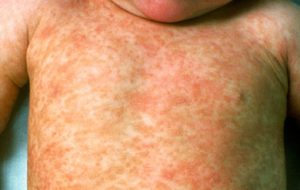Eczema in children: 7 tips to stop the itch
Dr Colin Holden, consultant dermatologist, has these tips for parents of babies and small children with eczema.
Get an eczema diagnosis
If you think your baby or child has eczema, see your GP to get a proper diagnosis and treatment. If necessary, your child may be referred to a dermatologist.
Don’t try to treat eczema by yourself. Each case can need different treatment, which usually involves a combination of moisturisers (emollients) and steroid creams and ointments.
If their skin becomes red and starts to seep liquid, it may be infected, in which case see your GP immediately for antibiotics.
Give your child a bedtime routine
Children with eczema often find sleeping a problem, as their skin can get hotter and itchier at night. Keep their bedroom cool and use cotton sheets or a light, natural-fibre duvet.
Apply moisturiser at least 20 minutes before bedtime to allow it to soak in. Keep pets out of the bedroom, as dogs and cats can make eczema worse.
Your GP or pharmacist may be able to recommend a suitable sedative antihistamine that may help your child sleep during a particularly bad flare-up of symptoms.
Avoid harsh soaps, shampoos and bath oils
Soap and bubble bath can make eczema far worse, as can washing your child too often.
Bathe your baby in warm - not hot - water, and stick to fragrance-free soaps, shampoo and bath oil. Your pharmacist or GP can advise you on what products to buy.
Use lots of moisturiser
Dry skin is more likely to flare up or become infected with a bacteria or virus. Use moisturising creams on your child as directed by your GP to make sure the skin affected by eczema is kept as soft and moist as possible. Avoiding harsh soaps that dry out the skin will also help.
Read more about moisturisers and how to use them on a child with eczema.
Help your child to stop scratching
One of the biggest problems with childhood eczema is the urge to scratch the itchy skin, which may then bleed or become infected.
See if your child scratches at certain times of the day, for example while watching TV, and try to teach them to do something else instead, such as tightly holding their arm.
Praise them for not scratching, or even use a star chart. Keep their nails short.
Cotton bandages, vests and/or leggings can help keep the cream in the skin and help prevent your child from scratching.
Check your child's diet
Eczema usually starts when a baby is around six months old. In about 10% of cases it is triggered by foods, including milk, eggs, citrus fruit, chocolate, peanuts and colourings.
If you suspect a food is causing your child's eczema, it's important to seek advice from your GP before you cut out the food to make sure your child still gets a balanced diet.
Read more about food allergy and intolerance.
Keep your child cool
Heat can make the skin itch more, so after your child has been running around or playing sports try to keep them as cool as possible in loose clothing.
If they've been swimming, rinse off any chlorine from the pool, as this can irritate the skin.
